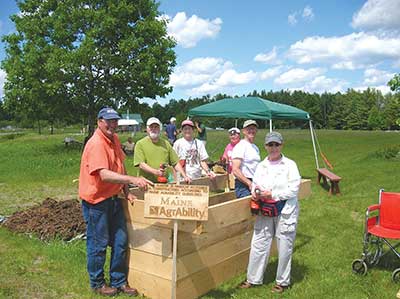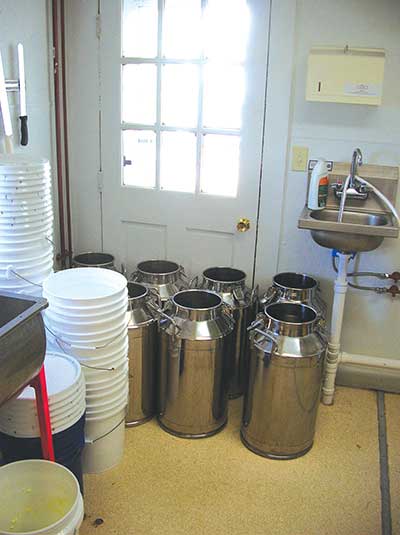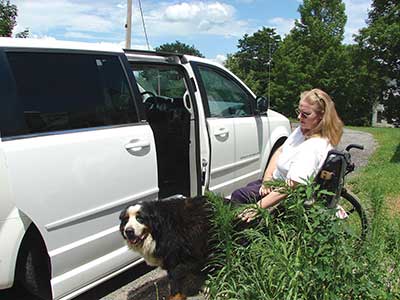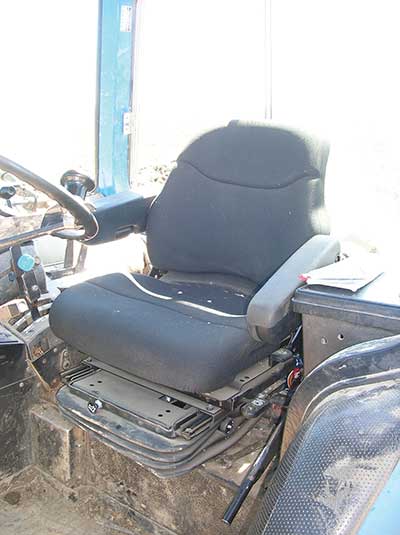 |
| AgrAbility outreach: working with volunteers to build a raised garden bed at Farm & Homestead Day at MOFGA |
 |
| Cheesemakers move hundreds of pounds of milk in the course of their work, which makes the ergonomics of the cheese room an important consideration. |
 |
| AgrAbility coordinated assistance to help a farm family purchase a modified van, easing isolation and enabling the family to increase its market reach. |
 |
| A new air-cushioned tractor seat replaced one that was completely worn out. The new seat will relieve lower back stress from the damaging effects of vibration. |
By Ellen S. Gibson
Photos by the author
Many would perceive that farmers are healthy individuals. After all, they work in the great outdoors with plants and animals, they are physically active, they are their own bosses. Yet farming is one of the most hazardous occupations, often involving large machinery, skittery animals and rough terrain. Farming is hard physical work. The weather can be extremely cold or intensely hot. In the course of a day’s work, farmers stoop, bend, grip, squat, kneel, lift, carry, twist and climb. They may be regularly exposed to harsh sunlight, toxic dust, excessive noise and vehicular vibration.
Farmers are also aging. According to the 2012 Census of Agriculture, the average age of a farmer in the United States is 58.3 years. Health risks and safety hazards increase with age, including slower reaction time, hearing loss, longer time to recover from an injury, decreased flexibility and decreased balance. Musculoskeletal disorders, chronic back pain and arthritis are common. Add to that financial uncertainty and mental stress, and suddenly farming seems like an awful risk for scanty rewards.
Where would we be if there were no one to farm?
Farmers supply our food. They play an essential role in supporting rural communities across the country. Although some may be struggling with debilitating health conditions and mental stress, farmers still want to farm. It’s a way of life, work that is a source of identity and great pride. How, then, can we support them?
The National AgrAbility Program was first funded in the 1990 farm bill with a mission “to enhance quality of life for farmers, ranchers, and other agricultural workers with disabilities, so that they, their families, and their communities continue to succeed in rural America.” One parameter of success was the continued employment in production agriculture. In the early years, AgrAbility consisted of the national program, housed at Purdue University in Indiana, and eight state programs. Today 22 state programs exist. Maine has had an AgrAbility program since 2010 and was refunded by the USDA in September 2018 for another four years.
Maine AgrAbility: Working Across the Agricultural Spectrum
The agricultural spectrum in Maine includes farmers and gardeners, fishermen and women, and forest workers (“harvesters” from here on). The mission of Maine AgrAbility is to inform, educate and assist harvesters, members of their families and hired help who struggle with pain, injury, chronic illness or disabling conditions so that they can continue to work successfully in agriculture.
The project is a partnership between the University of Maine Cooperative Extension and Alpha One, a nonprofit that provides independent living skills to people with disabilities to help them live more fully in all aspects of their lives. Collaboration allows staff to draw on the broad base of agricultural and business resources available through Extension and on the occupational-therapy-driven services of Alpha One. In addition, staff networks with many Maine organizations and agencies that serve the agricultural community.
The words “disability” and “limitations” cover a wide spectrum. We have worked with a farmer who was mauled by a bull, a farmer’s wife with multiple sclerosis and an aspiring farmer with autism. We have recommended tractor modifications and pointed out many times the need to replace tractor seats that are completely shot. We have worked with farmer veterans who live in chronic pain due to service-related injuries. We have compiled a tool for cheesemakers to assess the ergonomics of their processing facilities, and developed a webinar on Universal Design in the barn, workshop, home and kitchen (see https://extension.umaine.edu/agrability/). We have provided tools to help people organize their lives after a traumatic brain injury. We have enlisted the help of occupational therapy students to study the health implications of stanchion milking versus parlor milking. We have made presentations to older gardeners and suggested new ways to continue the work they love (see our website for references).
Maine AgrAbility staff works closely together using the skills from each of our disciplines to address the diverse needs of our customers. Their needs vary widely and could include information about the Beginning Farmer Resource Network, vocational rehabilitation, or business services through SCORE (Service Corps of Retired Executives – part of the Small Business Administration) or the Small Business Development Centers. Our services are free, but unlike other USDA-funded programs, we have no money to give out. For those looking for financial assistance, we list potential funding sources.
With new grant funding, we now have four occupational therapists (OTs) on staff. Each is familiar with the physical and mental health vulnerabilities in agricultural occupations. Brie Weisman, an OT who recently joined the team, explains, “AgrAbility is a mechanism for connecting farmers, loggers, fishing industry workers and home gardeners to the adaptive tools and techniques they need to continue to follow their passions and enjoy working in the great outdoors.” Weisman and her husband raise sheep on their Rumford farm.
Another new staffer, Anne Devin, is a former Marine and current owner of Chase Stream Farm. She works with our farmer veterans and says, “As the veteran outreach coordinator, AgrAbility has given me the opportunity to connect with other veteran farmers in a meaningful way. We are moving forward with helping veterans who struggle with PTSD and traumatic brain injury to help manage mental fatigue and navigate the business aspects of running their farms.”
We are grateful to have received funding to continue this work for another four years. We look forward to helping Maine harvesters continue to do meaningful and rewarding work. Visit our website for news, client success stories and staff contacts. Our Pinterest page is full of great tools for gardening and farming. And thanks to new staffer Lynne Holland, we have a current and informative presence on Facebook.
Holland, who works for Cooperative Extension in the Androscoggin/Sagadahoc office, sums it up when she says, “AgrAbility means opportunity, not only for people who need some help doing what they love to do and make a living at it, but for the rest of us to learn what barriers can be broken, what new tools and techniques can be developed, and what strategies can be put into place quickly should they be needed.”
About the author: Ellen has been on the Maine AgrAbility staff since 2010. She is currently exploring the intersection of aging, quality of life and local foods. She raises Nubian goats for meat, milk and breeding stock on her farm in West Paris.
